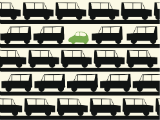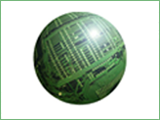IMDEA Networks

Event Category: In-house Presentation
The ICSI Haystack: A Tool to Illuminate the Dark Side of the Mobile Ecosystem
As a society we have come to rely upon our mobile phones for myriad daily tasks. It is striking how...
Seguir leyendo arrow_right_altI Always Feel Like Somebody’s Watching Me. Measuring Online Behavioral Advertising
Online Behavioral targeted Advertising (OBA) has risen in prominence as a method to increase the effectiveness of online advertising. OBA operates by associating tags or labels to users based on their online activity and then using these labels to target them.
Seguir leyendo arrow_right_altSteering with Eyes Closed: Millimeter Wave Beam Steering without In-Band Measurement
Spectrum scarcity and ever increasing densities of wireless network deployments have recently led to an opening of the 60 GHz millimeter-wave bands for unlicensed communication. In contrast to the previously used ISM bands below 5 GHz, a massive amount of 6-9 GHz of bandwidth is available at these frequencies. Usage of these resources is considered for wireless LAN and 5G cellular networks and with the ratification of the IEEE 802.11ad standard in December 2012, wireless LAN is about to bring millimeter-wave communication to the commercial market.
Seguir leyendo arrow_right_altRoute Bazaar: Automatic Interdomain Contract Negotiation
While some see in Border Gateway Protocol (BGP) a routing ambrosia to be enshrined, others perceive a basis of serious Internet connectivity limitations. Because the interdomain routing protocol realizes contracts between Autonomous Systems (ASes), this paper argues that contractual and routing issues need to be tackled jointly to overcome the connectivity limitations. We propose Route Bazaar, a backward-compatible system for flexible Internet connectivity. Inspired by the decentralized construction of trust in cryptocurrencies, Route Bazaar uses a decentralized public ledger and cryptography to provide ASes with automatic means to form, establish, and verify end-to-end connectivity agreements.
Seguir leyendo arrow_right_altTowards Preventive Safety Systems for Cars: The Impact of Driving Habits in Accident Prediction
The impact of car accidents in human lives calls for a profound understanding of accident risk. However, the unpredictability of accidents and the unfeasibility of their reproduction make it difficult to identify the causes and patterns underlying individual accidents.
Seguir leyendo arrow_right_altFloating Band D2D: Exploring and Exploiting the Potentials of Adaptive D2D-enabled Networks
In this paper, we propose Floating Band D2D, an adaptive framework to exploit the full potential of Device-to-Device (D2D) transmission modes.
Seguir leyendo arrow_right_altLightweight Mobile Bandwidth Availability Measurement
Mobile data traffic is increasing rapidly and wire- less spectrum is becoming a more and more scarce resource.
Seguir leyendo arrow_right_altChallenge: Resolving data center power bill disputes: the energy-performance trade-offs of consolidation
In this paper we challenge the common evaluation practices used for Virtual Machine (VM) consolidation, such as simulation and small testbeds, which fail to capture the fundamental trade-off between energy consumption and performance. We identify a number of over-simplifying assumptions which are typically made about the energy consumption and performance characteristics of modern networked systems.
Seguir leyendo arrow_right_altEmulating Highly Consistent Shared Storage on top of Unreliable Message-Passing Nodes
Distributed Storage Systems ensure data availability and survivability be replicating data in geographically disperse storage devices. Replication allows multiple processes to access the data concurrently each communicating with different storage device.
Seguir leyendo arrow_right_altRemote Peering: More Peering without Internet Flattening
The trend toward more peering between networks is commonly conflated with the trend of Internet flattening, i.e., reduction in the number of intermediary organizations on Internet paths. Indeed, direct peering interconnections bypass layer-3 transit providers and make the Internet flatter.
Seguir leyendo arrow_right_alt











Comentarios recientes